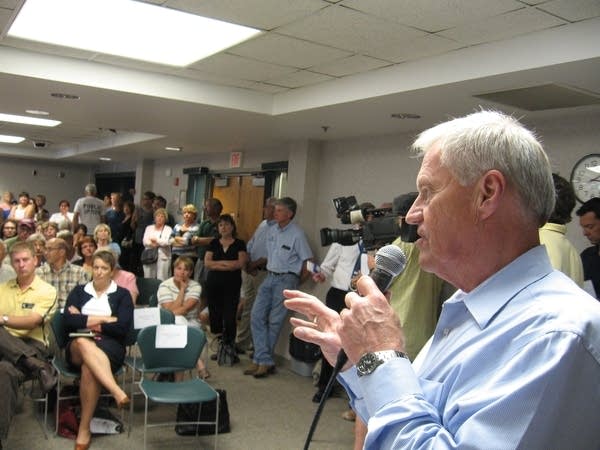Rep. Peterson cites coverage disparity in health care 'no' vote
Go Deeper.
Create an account or log in to save stories.
Like this?
Thanks for liking this story! We have added it to a list of your favorite stories.

The only Minnesota Democrat to vote against the health care bill in the House is speaking out about his "no" vote.
Rep. Collin Peterson says he voted against the health care bill in part because it doesn't cover as many uninsured people in his district compared to the nationwide average.
Peterson, who represents Minnesota's 7th District, was a bit reclusive when it came to talking on tape about his vote health care before the vote.
Now that President Obama has signed the bill into law, Peterson is elaborating. He says one of the reasons he voted against the bill was because it's unfair to give other areas of the country more aid because they don't have state programs to help cover their uninsured.
Turn Up Your Support
MPR News helps you turn down the noise and build shared understanding. Turn up your support for this public resource and keep trusted journalism accessible to all.
"We have 11 percent uninsured, but this bill will only pick up 37 percent of those uninsured," he said. "But there's other districts where, the average around the country they're picking up with this bill is 70 percent."
University of Minnesota health care management and policy professor Lynn Blewett says it is true that areas of the country with more uninsured people will get proportionately higher benefits. But she says that's not the whole story. It's important to look at the total number of people in the 7th District who have insurance, she says.
"It looks like it's 37 percent of the uninsured in his district would receive coverage but overall his entire district, they have 94 percent coverage rates with this new bill," Blewett said. "So I think the numbers are just a little bit off."
Still, Peterson says Minnesota has fewer uninsured to start with because it chose to cover more people. Now, the bill is giving more money to those states that chose not to extend coverage to more of their own residents.
"That means that their states are not doing what Minnesota's doing, see? That's the point I'm trying to make here so we're in effect going to be paying more into the system to cover people who weren't doing the right thing in the first place."
Asked if he would have voted for the bill if it covered more uninsured people in his district, Peterson said: "Well, it wasn't exactly that. I'm afraid we're going to build another disparity into the system that's more my concern, but I had other problems with the bill as well."
Peterson says he was disappointed that the bill doesn't contain any significant cost controls on health care. He said he did support other items in the bill such as eliminating pre-existing conditions in insurance.
Peterson says it's a convoluted health care system, and the bill doesn't fix much of it. He says now that the bill is law he'll turn his focus to trying to make it work as best as it can for Minnesota.
Dear reader,
Political debates with family or friends can get heated. But what if there was a way to handle them better?
You can learn how to have civil political conversations with our new e-book!
Download our free e-book, Talking Sense: Have Hard Political Conversations, Better, and learn how to talk without the tension.





